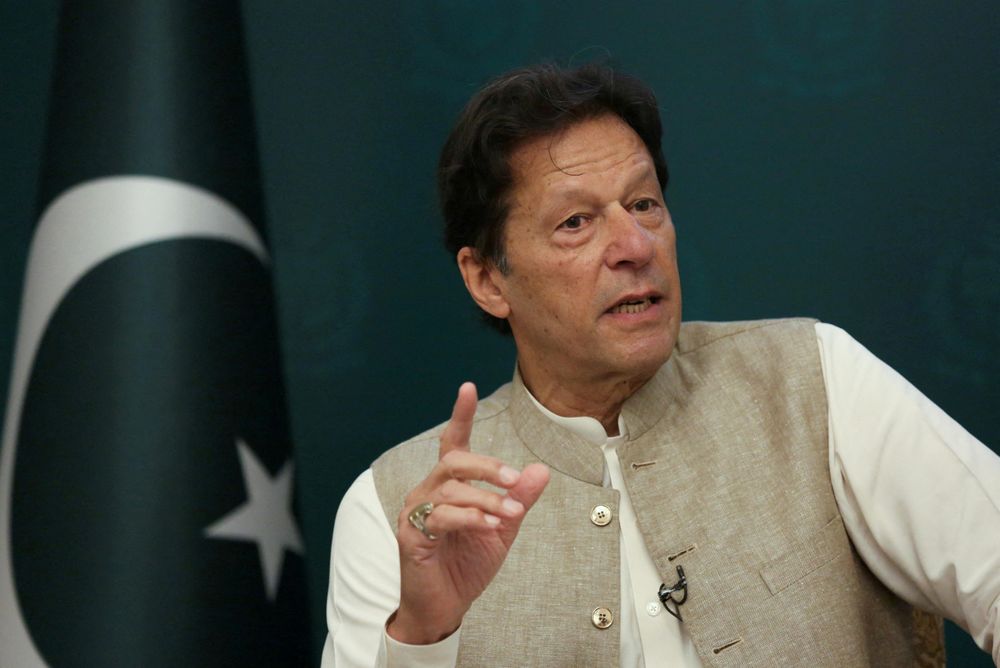
Imran Khan speaks during an interview with Reuters in Islamabad.
Pakistan’s PM Imran Khan is no stranger to controversy.
He has called Osama bin Laden a martyr of Islam. He’s praised the Taliban for breaking the shackles of slavery. Khan hasn’t defended rape, but he has lectured women on how to dress modestly to avoid it – something detractors call a tad rich, considering his past as a West End playboy.
Yet, Khan, now a self-declared, born-again Muslim, has been brazen and unapologetic about his brand of politicized Islam. In office, he’s been decidedly anti-West and pro-China. And in a new foreign policy pivot, Khan stood by Vladimir Putin’s side on the eve of Russia’s invasion of Ukraine, defending his trip to Moscow by saying it was “an exciting time” to be at the Kremlin.
But the 68-year-old Kaptaan — Captain, as he’s known for his cricketing accolades and carefully cultivated against-all-odds brand of leadership — is officially in trouble. Later this week, he’ll face a vote of no-confidence in Pakistan’s notoriously corrupt and raucous parliament.
Statistically, this was expected. The premiership is a poisoned chalice in Pakistan, where no prime minister has ever managed to complete a full term. Assassinations, coups, and everything in between have seen to that. With just over a year left in his five-year term, it seems that Khan too is headed in that direction.
To oust Khan, the country’s usually divided opposition groups — which are constituted on Pakistan’s various ethnic and nationalist faultlines in a multi-party system — have rallied under the united banner of the Pakistan Democratic Movement.
They say Khan has failed to curb inflation, manage the economy, and implement a respectable foreign policy. They also claim to have the numbers to remove him from power in parliament. In response, Khan has doubled down, bestowing profanities and threats, and fired up his Islamist base. Human Rights Watch has warned about expected violence.
But the biggest arbiter of Pakistani politics is the 650,000-strong military, which has called the shots for decades and carried out several successful coups. Indeed, in cricket-crazy Pakistan, the military is popularly known as the “third umpire” — the official who runs the game invisibly, not from the field of play, but from behind locked doors, deciding the match from afar.
Thus, by default if not by design, the country’s most powerful man is not the PM but rather army chief Gen. Qamar Javed Bajwa.
Although Bajwa was picked by Khan’s predecessor and was supposed to retire three years ago, he stayed on after being awarded an extension by Khan. Now, according to Islamabad watchers, he still doesn’t want to hang up his guns.
But Khan has other plans: he wants to appoint an officer closer to him for the top job. This is Lt. Gen. Faiz Hameed, a former intelligence chief now in charge of counter-terror operations in the country’s volatile western theater bordering Afghanistan. Hameed was pivotal in stabilizing Kabul after the return of the Taliban last summer and also helped Khan ascend to office through political maneuvering. Bajwa wants none of this and – even though the military officially says it’s neutral – seems to have pulled the plug that was powering Khan’s regime.
It’s NOT the economy, stupid. There’s no real economic justification for ousting Khan.
“[His] economic performance has been a mixed bag if it’s graded on a curve and with the caveat that his government not only inherited an economic crisis but had to navigate a global pandemic,” says Uzair Younis, director of the Pakistan Initiative at the Atlantic Council in Washington DC. The real issue is the civil-military imbalance. “We have to ask ourselves, why is it that every single elected prime minister faces these ouster challenges and why not a single one has ever completed a full five-year term?”
But hubris, heavy-handedness, and a habit of ditching his friends and not working with the opposition may also be responsible for Khan’s possible exit.
“A major factor [is] his inability to keep his friends close and his enemies closer … He had a marriage of convenience with men he once called thieves; but after coming to power, he did not engage with them from a position of strength,” Younis adds.
“This holier-than-thou attitude that Khan has, where he sees himself above the dirty business of politics, is Khan’s greatest weakness.”
